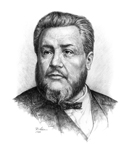“The cloak that I left at Troas with Carpus, when thou comest, bring with thee, and the books, but especially the parchments.”—2 Timothy 4:13.
We do not know what the books were about, and we can only form some guess as to what the parchments were. Paul had a few books which were left, perhaps wrapped up in the cloak, and Timothy was to be careful to bring them. Even an apostle must read. Some of our very ultra Calvinistic brethren think that a minister who reads books and studies his sermon must be a very deplorable specimen of a preacher. A man who comes up into the pulpit, professes to take his text on the spot, and talks any quantity of nonsense, is the idol of many. If he will speak without premeditation, or pretend to do so, and never produce what they call a dish of dead men’s brains—oh! that is the preacher. How rebuked are they by the apostle! He is inspired, and yet he wants books! He has been preaching at least for thirty years, and yet he wants books! He had seen the Lord, and yet he wants books! He had had a wider experience than most men, and yet he wants books! He had been caught up into the third heaven, and had heard things which it was unlawful for a men to utter, yet he wants books! He had written the major part of the New Testament, and yet he wants books! The apostle says to Timothy and so he says to every preacher, “Give thyself unto reading.” The man who never reads will never be read; he who never quotes will never be quoted. He who will not use the thoughts of other men’s brains, proves that he has no brains of his own. Brethren, what is true of ministers is true of all our people. You need to read. Renounce as much as you will all light literature, but study as much as possible sound theological works, especially the Puritanic writers, and expositions of the Bible. We are quite persuaded that the very best way for you to be spending your leisure, is to be either reading or praying. You may get much instruction from books which afterwards you may use as a true weapon in your Lord and Master’s service. Paul cries, “Bring the books”—join in the cry.
Our second remark is, that the apostle is not ashamed to confess that he does read. He is writing to his young son Timothy. Now, some old preachers never like to say a thing which will let the young ones into their secrets. They suppose they must put on a very dignified air, and make a mystery of their sermonizing; but all this is alien from the spirit of truthfulness. Paul wants books, and is not ashamed to tell Timothy that he does; and Timothy may go and tell Tychicus and Titus if he likes—Paul does not care.
Paul herein is a picture of industry. He is in prison; he cannot preach: what will he do? As he cannot preach, he will read. As we read of the fishermen of old and their boats. The fishermen were gone out of them. What were they doing? Mending their nets. So if providence has laid you upon a sick bed, and you cannot teach your class—if you cannot be working for God in public, mend your nets by reading. If one occupation is taken from you, take another, and let the books of the apostle read you a lesson of industry.
An extract from the sermon Paul—his Cloak and His Books

